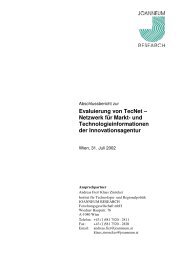roadMAP [PDF, 1.9 MB] - fteval
roadMAP [PDF, 1.9 MB] - fteval
roadMAP [PDF, 1.9 MB] - fteval
Create successful ePaper yourself
Turn your PDF publications into a flip-book with our unique Google optimized e-Paper software.
enefit/cost analysis” where the data collection turned out to be frustrating in particular in<br />
companies as they very reluctant to present figures, as e.g. on sales. Through interviews and<br />
the structure of the NCE-projects it was evaluated if real or fake collaboration took place. The<br />
third evaluation in 2002 on the rationale of the program summarised that the NCE program is<br />
seen “still as a valuable and unique part of the Canadian research landscape” and gave a<br />
strong recommendation to continue the program. The evaluation methodologies included<br />
International literature review, a review of the NCE performance data and other reports, Survey<br />
of all network partners through an e-mail based survey, interviews with the Network Scientific<br />
Leaders and Network Managers and web-based survey of Network Researchers, finally<br />
interviews with members of the Expert Panels and NCE Selection Committee.<br />
As shown above the StarMAP countries have gained much more experience in particular on<br />
programme evaluation which is evident as most of these programmes run for more then a<br />
decade meanwhile.<br />
7.5 Lessons from the MAP-TN and StarMAP<br />
Coming to an end we want to go back to the very start of our work, were we tried to figure out<br />
which concrete characteristics of MAPs (as defined by the MAP-TN) have which consequence<br />
on the evaluation. Most important seems to be the proper integration of formative evaluation<br />
approaches based on a judgement of the network members.<br />
The following picture can give an outlook on the further challenges in the field of evaluation of<br />
some of the MAP-TN programmes: The common understanding that evaluation has to be a<br />
strategic exercise, which needs a lot of professional know-how as well as a professional and<br />
competent management for the sound implementation of evaluation results. One more point is<br />
that a lot of MAPs struggle with the problem of vested interest: There is an certain need for<br />
more independency, transparency and publicity of evaluation results.<br />
Exhibit 25: Conclusions and outlook<br />
100<br />
More<br />
Strategic<br />
More<br />
Independent<br />
More<br />
Public<br />
More<br />
competence<br />
More forward<br />
looking<br />
HU: Evaluation strategy, coherent and consistent<br />
implementation<br />
Training for programme Managers<br />
SLO: More structured and professional<br />
management<br />
DE: More strict approach against different<br />
attempts to influence evaluation<br />
UK: Evaluation should be an independent and<br />
Public check on performance<br />
ES: Evaluation should be structured in a<br />
public way with clear impacts on<br />
posterior versions of programmes<br />
UK: more forward looking<br />
<strong>roadMAP</strong>


![roadMAP [PDF, 1.9 MB] - fteval](https://img.yumpu.com/21079876/105/500x640/roadmap-pdf-19-mb-fteval.jpg)

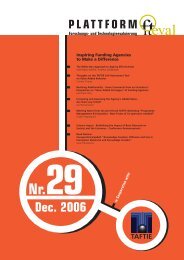
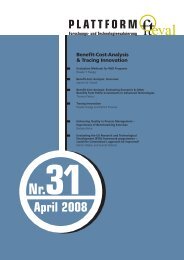
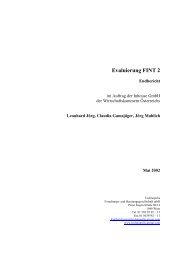
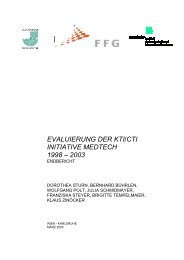
![GuggenbergeronBoku [PDF, 73.4 KB] - fteval](https://img.yumpu.com/21024081/1/184x260/guggenbergeronboku-pdf-734-kb-fteval.jpg?quality=85)
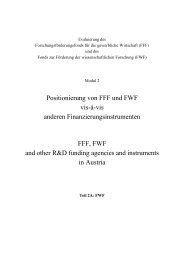
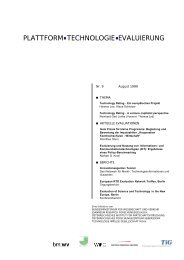
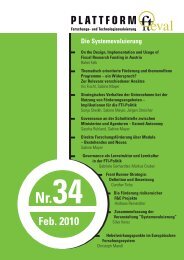
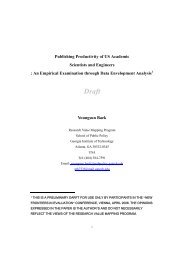
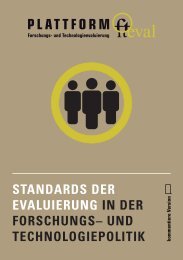
![ITF_Energietechnik [PDF, 39.6 KB] - fteval](https://img.yumpu.com/20959076/1/184x260/itf-energietechnik-pdf-396-kb-fteval.jpg?quality=85)
![Evaluation Standards [PDF, 120.8 KB] - fteval](https://img.yumpu.com/20931509/1/184x260/evaluation-standards-pdf-1208-kb-fteval.jpg?quality=85)
